2026-03-05 22:59:18
We’ve known Apple would follow up its blockbuster film F1: The Movie with live coverage of F1 races in 2026. Now that we’re approaching the first grand prix weekend of the year, the company has provided details on what fans can expect to see inside the Apple TV app and beyond.
There’s already a dedicated F1 channel in the Apple TV app, which is where you’ll stream races live when the time comes. You can also watch practice sessions, sprint races and both pre- and post-race coverage. Apple offers a number of additional F1 videos there (I’d recommend watching the one on the new rules) and you’ll be able to stream the latest season of Drive To Survive on Apple TV as well.
Apple will offer the F1 TV feed as the main broadcast alongside the Sky Sports feed for all races. If you’ll recall, ESPN used to show the Sky Sports feed with Sky’s commentary team for its coverage of F1. Apple says it’ll broadcast every grand prix in 4K (Dolby Vision) with 5.1 audio (no mention of Dolby Atmos).
As part of Apple’s deal with F1, Apple TV subscribers get F1 TV Premium for the 2026 season. This gives you access to things like onboard cameras, team radios and live telemetry in addition to live coverage of the entire grand prix weekend. So, you can watch races on Apple TV or F1 TV, depending on your app preferences, or use the additional features of F1 TV Premium as a second (or third, etc.) screen setup. Netflix will also broadcast the Canadian Grand Prix in May as part of the deal that brought Drive To Survive to Apple TV.
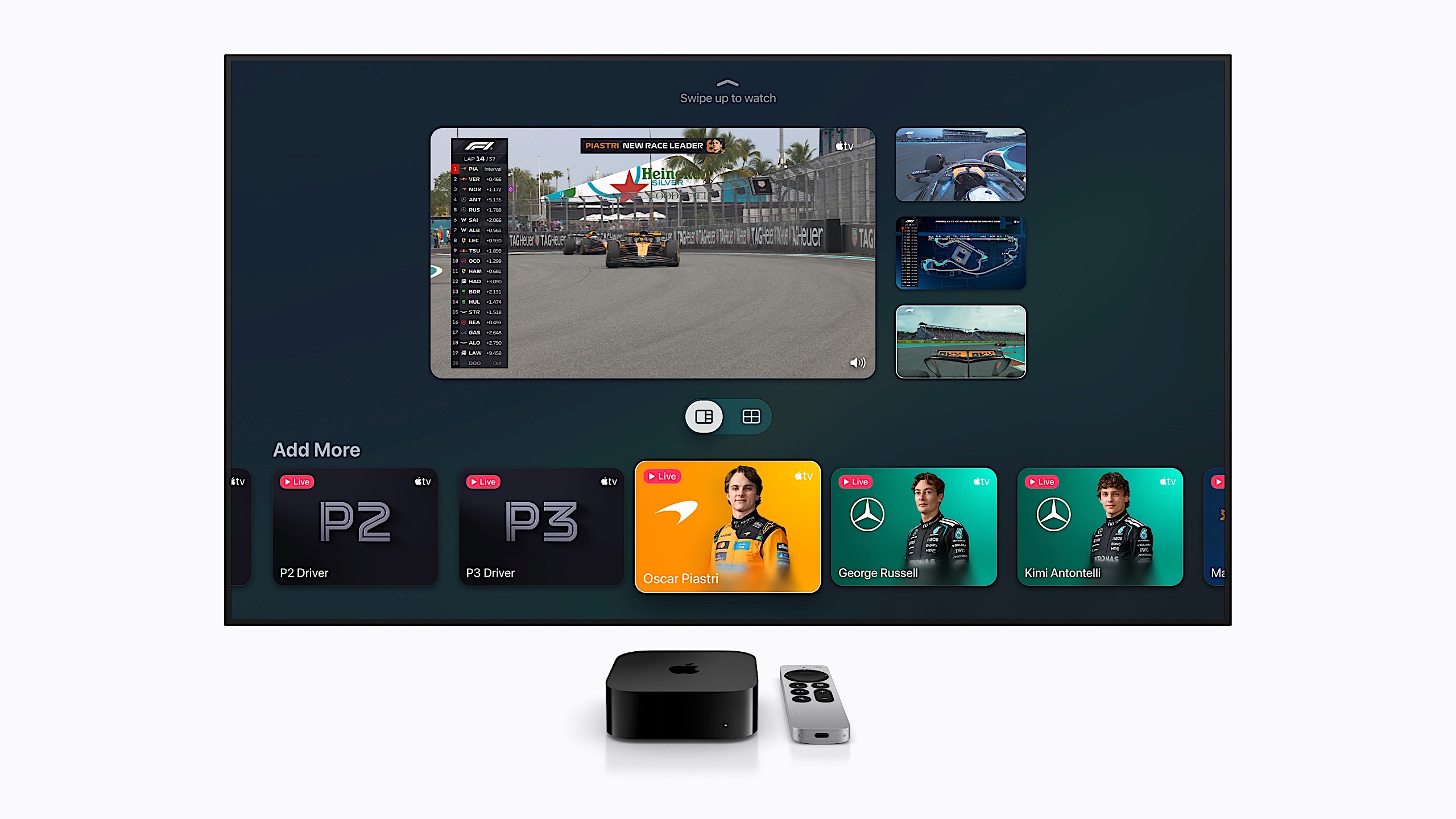
Full replays for all sessions will be available in the Apple TV app as well. Apple will offer a condensed race in 30 minutes replay option too, and the company says it’s working to hide spoilers in case users are watching after the race begins or concludes.
Apple has cooked up some new features for F1 grands prix as it takes over broadcast rights in the US. When you click on the F1 channel in the Apple TV app, the current grand prix week’s content is up top and you have the option to follow F1 so that you get notifications about the various events. Apple will provide a Driver Tracker, Driver Data and dedicated feeds for P1, P2 and P3. You can also watch the driver onboard cameras for each car in the Apple TV app. So, you don’t necessarily have to venture out to F1 TV for those things.
Apple will provide various Multiview options so you can put the main broadcast next to driver cams and race data. The company will offer some preset configurations, but you can make your own Multiview mix too. If you like Mercedes, for example, you can watch the main feed with driver cameras from Russell and Antonelli right beside it. Apple says Multiview will support up to five feeds at once (one main in the middle with two smaller ones on each side).
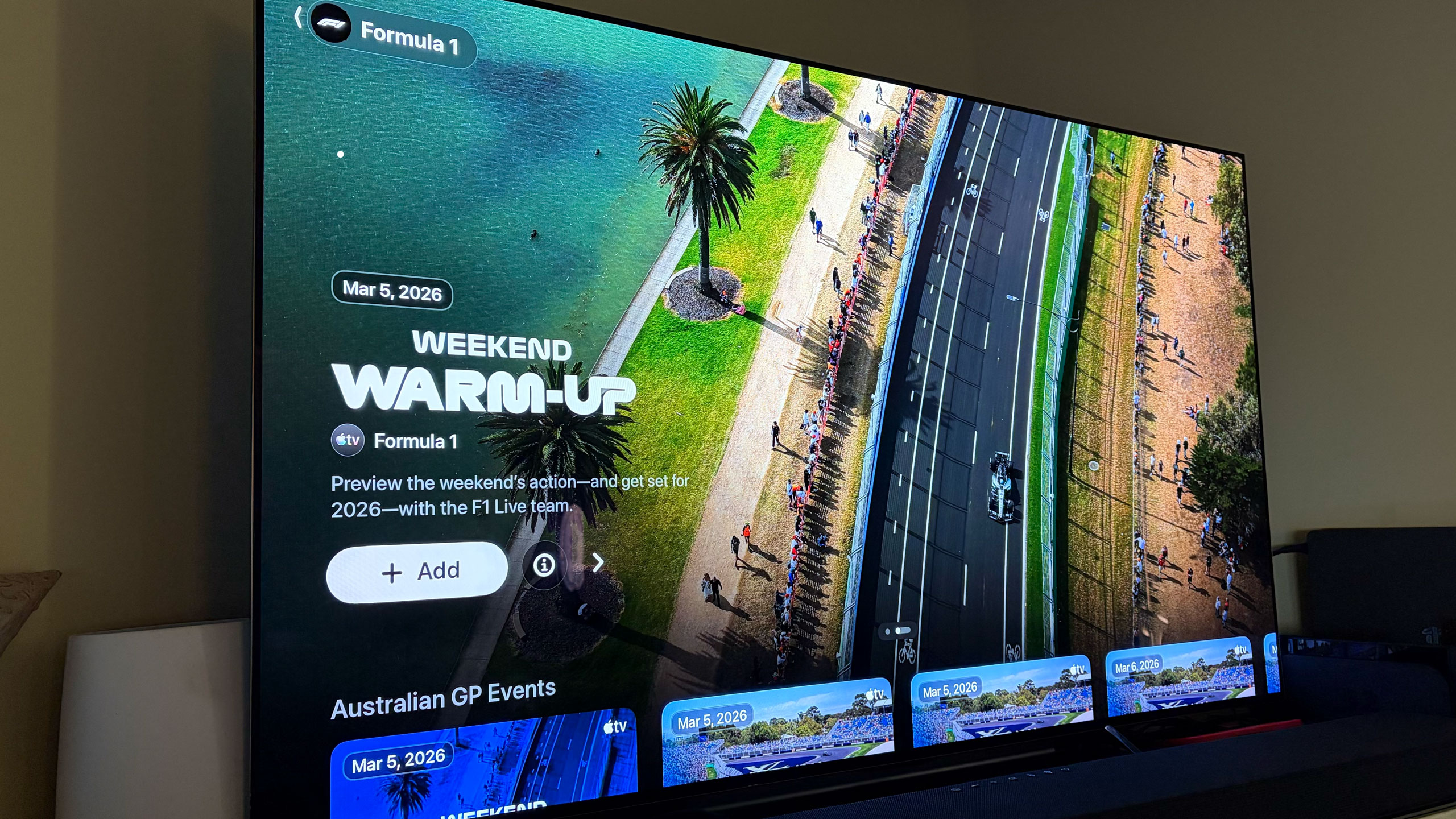
If you can only listen to races, you can hear live coverage and commentary in Apple Music through a dedicated radio streaming channel. There are also updated features for Apple News, Apple Sports and Apple Maps, the latter of which will have detailed info for fans attending in-person so they can hopefully avoid any surprises — like road closures — on race day.
The first race of the season is in Australia (March 6-8). Practice begins Friday with qualifying on Saturday and the grand prix on Sunday. Or if you live in the US, that will be Thursday night through Saturday night (race begins at 11PM ET).
This article originally appeared on Engadget at https://www.engadget.com/entertainment/streaming/everything-you-need-to-know-about-streaming-f1-on-apple-tv-190600771.html?src=rss2026-03-05 22:00:00
You'd be forgiven for thinking that the Samsung Galaxy S26 Ultra looks a lot like the last four models. That's because it does, right down to its general design and rear camera layout. But on Samsung's latest flagship phone, some stealthy upgrades are hidden beneath its classic blocky silhouette that might go unnoticed by the casual observer. Those help make this year's release feel like a better deal than its most recent predecessor. It remains rather expensive, starting at the same $1,300 as before, but considering the price of RAM these days, that almost feels like a blessing. So while it won't hit you over the head with monumental changes year over year, it's subtly one of the best Ultras we've gotten in the past half-decade.
After dabbling with titanium frames on the last two Ultras, Samsung returned to aluminum for 2026. The company says this makes it easier to color-match the phone's chassis to the Corning Gorilla Armor 2 panels on the front and back, though it's incredibly difficult to see the impact on my black review unit. Elsewhere, the company shaved a few grams off its total weight and a few millimeters off its thickness (7.9mm and 214 grams), but even when directly comparing the new model to last year's S25 Ultra (8.2mm and 218 grams), that difference is basically imperceptible. I almost think the S26 Ultra's extra sleekness was just so that people would stop saying the Z Fold 7 is lighter than Samsung's most premium traditional candybar-style handset.
As always, there's a built-in storage slot for Samsung's S-Pen, which is essentially a carbon copy of what we got last year without any functional changes. However, because the phone's corners are more rounded than ever, one small peculiarity is that now there's a right and wrong way to insert it. No matter what you do, the stylus will stay put, but if you don't align the curve on the end of the S-Pen with the shape of the phone's corner, it just doesn't look right.

The S26 Ultra's 6.9-inch screen is easily its most undercover upgrade because it sports essentially the same specs as last year. You still get 2,600 nits of peak brightness with a variable 120Hz refresh rate and a max resolution of 3,120 x 1,440. The secret is that with the touch of a button, you can activate Samsung's Privacy Display, which effectively stops others from spying on your screen when viewed from acute angles (both from the side and up and down).
When you turn the Privacy Display on and look at the phone less than head-on, everything sort of fades to black. Depending on the angle, you may still see an outline of UI elements and some bright spots depending on your content, but the wider you go, the fainter things get. The way it works is that the phone has two sets of subpixels, narrow and wide, the latter of which get turned off when the feature is active. And if you're really concerned about people snooping on you, there's an extra level called Maximum Privacy Protection that makes almost everything completely go gray, though there are trade-offs for this.

When using the standard Privacy Display mode, there's very little impact on image quality and brightness, so it's not that big of a deal to leave it on all the time. If you look closely, you may notice what appears to be a small drop in resolution, though this requires some serious pixel peeping and good eyesight. But with maximum protection on, there's a noticeable drop in contrast and luminance that, for me, isn't worth the increased privacy.
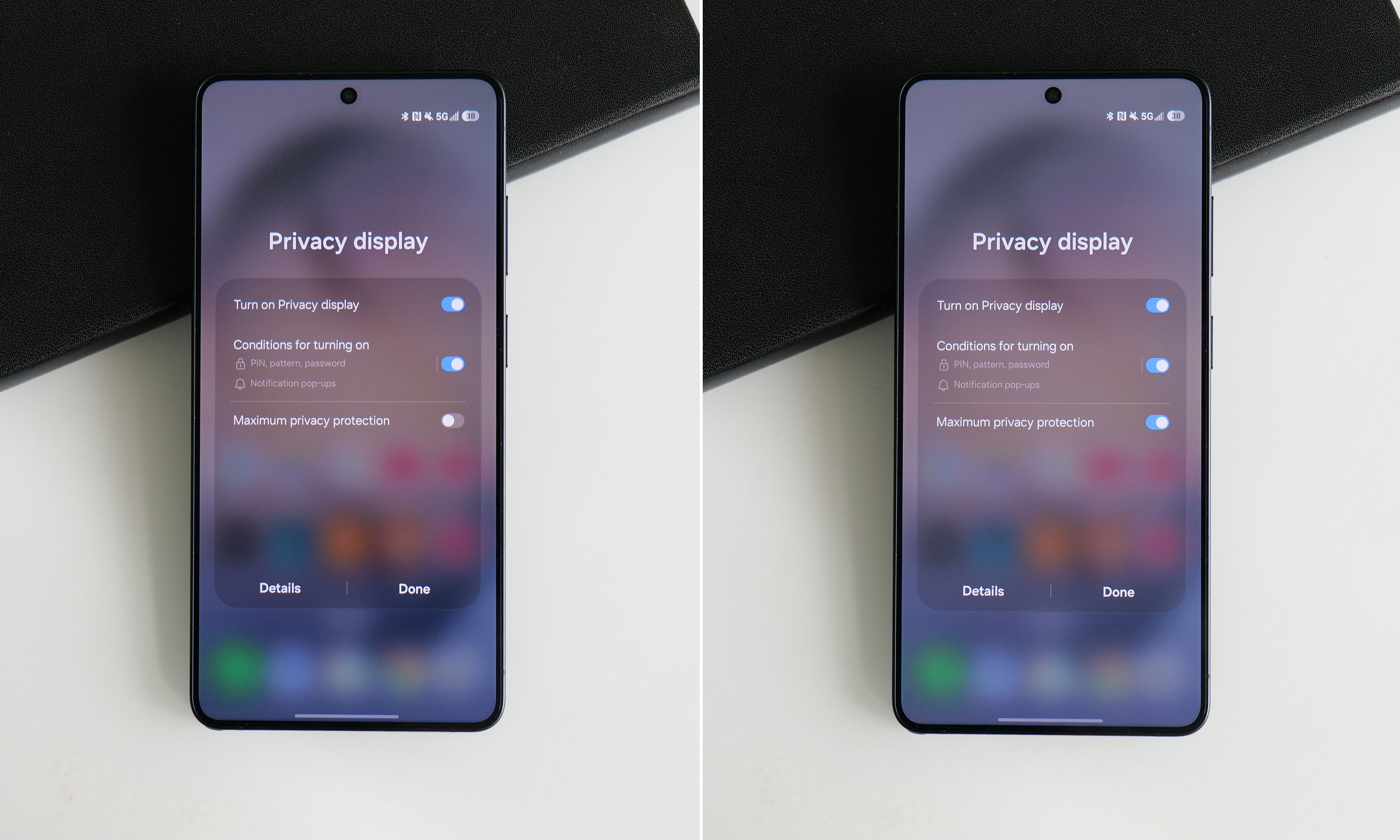
Thankfully, there's a third option, which is to have the phone selectively activate Privacy Display under certain conditions. You can have it automatically turn on when you get notifications or open selected apps (like for banking or authenticators), which is what I prefer. The phone can also enable the feature when you need to enter a PIN, pattern or password. The caveat is that this only applies to system-level prompts like your lock screen. Theoretically, there's no reason the S26 Ultra can't do this anytime you're presented with a password or PIN prompt, but every app needs to be optimized properly, so that isn't a thing just yet. Regardless, it's a powerful tool that can prevent people from gleaning sensitive info while you're and about and I really hope it becomes standard inclusion on all premium phones going forward.

The main engine powering the S26 Ultra is Qualcomm's Snapdragon 8 Elite Gen 5 chip for Galaxy along with 12GB or 16GB of RAM and up to 1TB of storage. Its biggest strength lies in its improved NPU, which is 39 percent more powerful than the previous generation, paving the way for improved AI-based features. That said, the rest of the processor provides some nice but not especially impressive gains in processing speed. Its CPU boasted 19 percent better performance while its GPU is around 24 percent beefier. In Geekbench 6, this translated to a multi-core score of 11,240 for its CPU (up from 9,828 on the S25 Ultra) and a GPU score of 25,403 (up from 19,863). Granted, it's not like its predecessor ever struggled with performance, but it's still worth noting that this is essentially as fast as an Android phone can get right now.
Of course, as we progress deeper into the AI era, Samsung has come up with a boatload of new and improved AI-powered tools as well. The most useful of these is Photo Assist, which serves as a one-stop shop for all your editing and content creation needs. In addition to fixing things like reflections or deleting objects in an image, you can use natural language text prompts to generate completely new elements like hats for your pets or pretty much anything else you can think of. And if that's not enough, there's also Samsung's Creative Studio, which is a playground for making all sorts of fun digital art like wallpapers, stickers and greeting cards.
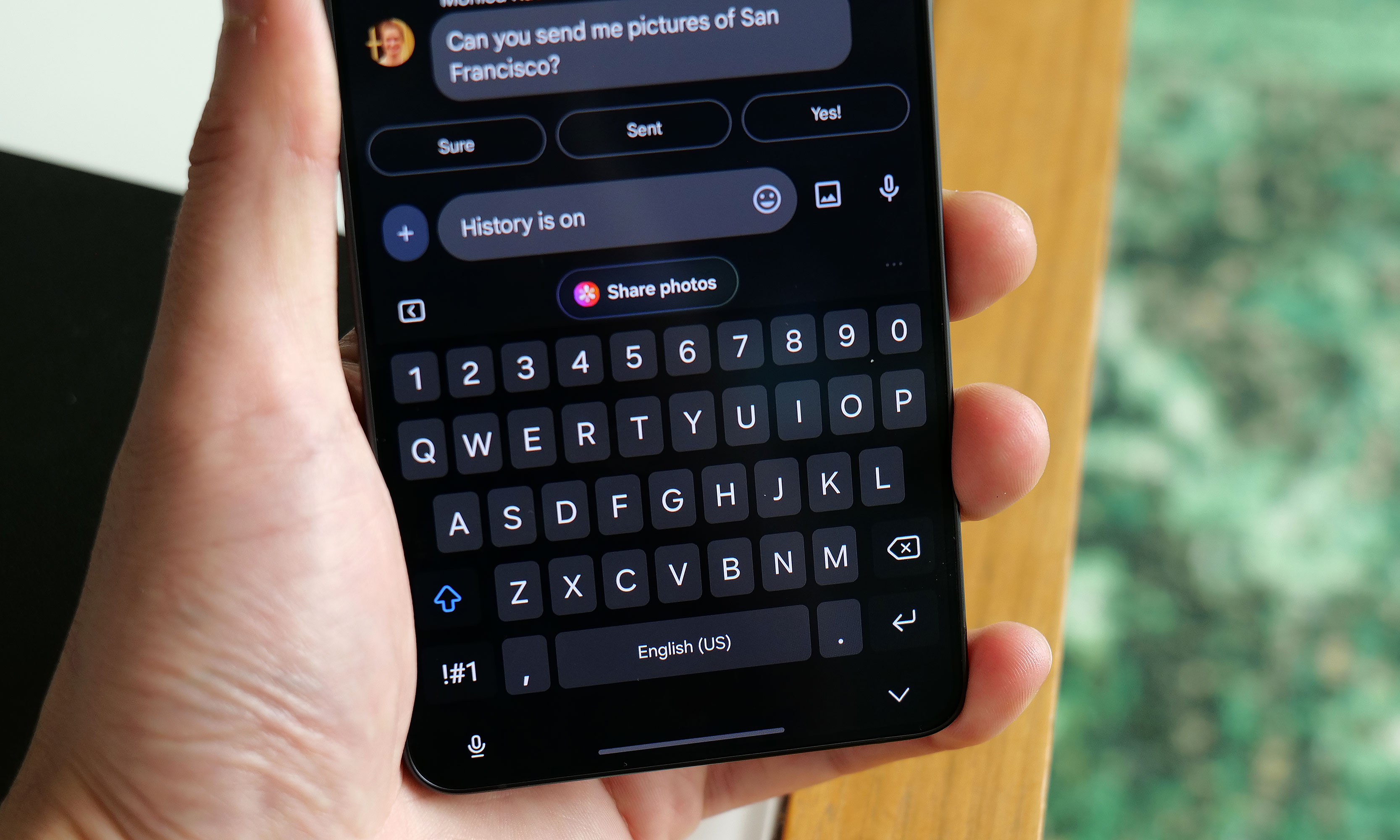
Elsewhere, there's also an improved document scanner and a call screener that's better at blocking spam and robocalls. All told, they're welcome upgrades and they work rather well. Samsung even borrowed an idea from Google's Magic Cue with its Now Nudge feature, which can surface relevant photos based on context anytime you’re using the Samsung keyboard. Unfortunately, what’s arguably the S26 Ultra's coolest new feature, Automated App Actions, isn't available for another week. But the bigger issue is that almost all of these features are things we've seen before on rival devices like the Pixel 10 Pro. While they're nice to have, it's gotten to the point where these tools are more like table stakes for high-end phones nowadays instead of being reasons you might want to upgrade.

While the sensors on the S26 Ultra haven't changed since the previous model, Samsung didn't completely forget about photo upgrades. Alongside its 10-megapixel 3x telephoto, 50MP ultra-wide and 12MP selfie cam, its 200MP main cam and 50MP 5x telephoto camera have larger apertures at f/1.4 and f/2.9, respectively (up from f/1.7 and f/3.4). So on top of already being able to take excellent photos during the day, the UItra's primary shooter is noticeably better at night.
In a shot of some Transformers in a dimmed room, the S26 Ultra basically matched what I shot with a Pixel 10 Pro — aside from some minor differences in white balance. Details were sharp and Samsung's photo was less noisy, which is due in part to a change in the phone's image processing. But the most impressive example of the Ultra's improved picture quality was when I took a very challenging backlit shot of a Grogu doll, in which the S26 did a better job of exposing Baby Yoda's face compared to the P10 Pro. So even without new sensors, Samsung has managed to make an already great main camera just a bit better.
The Galaxy S26 Ultra features a 5,000mAh battery, just like what we got on the previous model. That means it's largely relying on power efficiency gains from its new chip for improved longevity, which it delivers, but it's not a major leap. On our local video rundown test, the S26 Ultra lasted 30 hours and three minutes, which is only about half an hour longer than before. That said, considering the only phones that have fared better were the OnePlus 15 and 15R, it's hard to be upset about its overall runtime.
As for charging, the Ultra has gotten a big leap in speed (assuming you have compatible power adapters) compared to its less expensive siblings. When using a cable, it now supports up to 60 watts versus 45 watts for the S26+ or just 25 watts for the base S26. And it's a similar story when charging wirelessly, with the Ultra now capable of hitting 25 watts when plopped on a pad compared to 20 watts for the S26+ and 15 watts for the S26.

The major annoyance is that Samsung still hasn't given any members of the S26 family a built-in magnetic ring for Qi2 charging or other magnetic accessories. The company claims this was done to help keep the phone as thin as possible, but honestly, I thought we had gotten over the desire for needless sleekness long ago. Sure, you can add that functionality back in by choosing the right case, but that's not a very premium experience and I sincerely hope this is the last time Samsung makes this omission on its flagship phone line.
There's a strange feeling I often get when testing phones. After I got everything updated and set up the way I like, I noticed it even more with the S26 Ultra. The issue is that despite using a brand new device with shiny hardware, better performance and a more refined design, I'm still largely doing the same things and using the same apps as I was before (like Google Maps, Gmail and whatever my go-to mobile games are at the moment). This means my daily flow is basically unchanged from device to device.
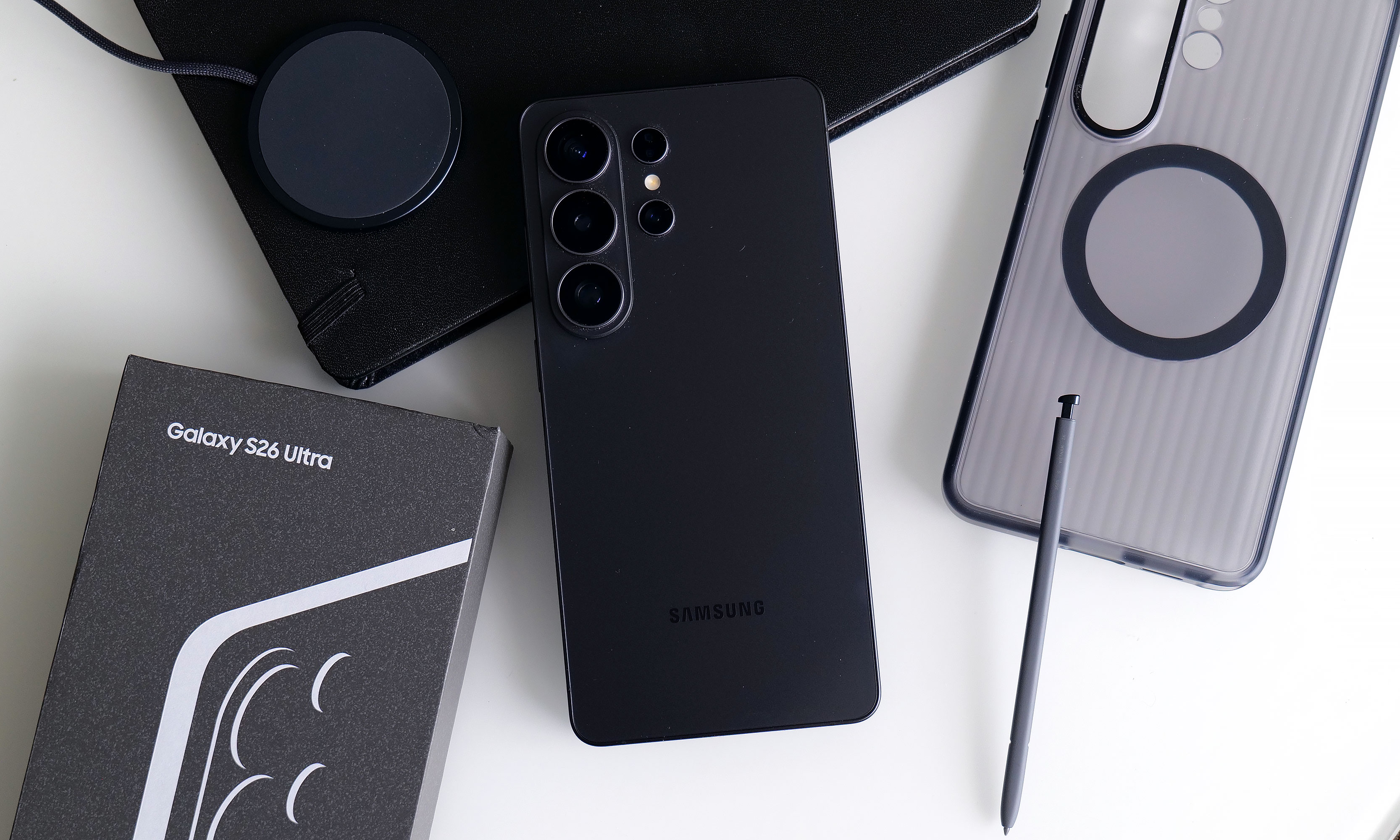
However, if you're paying attention, you'll notice things like higher framerates while gaming, sharper and more well-exposed photos at night and helpful suggestions like when the phone surfaces relevant photos in the middle of a text conversation. This goes double for the S26 Ultra, whose biggest upgrade — the Privacy Display — is something meant to stop other people from snooping at what you're doing. When it's on, you probably won't even be able to tell, which is kind of the point.
There’s no doubt that the S26 Ultra is an improvement over last year’s phone. It’s faster, it takes better low-light photos and thanks to all of its new AI features, the handset feels smarter too. But it takes a discerning eye to spot and feel all these differences, particularly if you’re upgrading from a device that’s only a year or two old. So while the S26 Ultra remains the top pick as a phone that can do pretty much everything really well, in the grand scheme of things, it’s more of a stealthy, undercover update than an eye-catching new crown jewel.
2026-03-05 21:28:39
One of the big surprises to come out of Sony’s recent State of Play showcase was the announcement of a sequel to 2021’s Kena Bridge of Spirits, the impressive debut from indie studio Ember Lab. If you missed the first game and want to catch up before its successor launches on PC and PS5 later this year, it’s coming to Switch 2 this spring.
The Switch 2 is very much in its port era, owing to publishers seizing the opportunity to take advantage of the new system’s popularity and improved graphical grunt. And while it’s hard to get too excited about a five-year-old game making its way to the latest Nintendo console, Kena’s gorgeous Pixar-lite aesthetic, cute critters and decidedly Zelda-y medley of combat, exploration and puzzle-solving make it a great fit for Switch 2.
If you missed it the first time around, Kena: Bridge of Spirits is a third-person action-adventure game that follows the eponymous Kena, a young spirit guide who helps wayward souls on their journey through to the afterlife. It has PS2 energy in the best possible way, and a deceptively deep combat system that will eventually catch you out if you don’t pay attention to enemy patterns.
While nothing about the game is particularly groundbreaking, Kena is a visual feast, which is unsurprising when you learn about Ember Lab’s roots in film animation. I’m quite looking forward to seeing how it looks running on the Switch 2’s big, bright handheld display.
The Switch 2 version comes with the Anniversary DLC, which features Charmstones, Spirit Guide Trials, new outfits, and various accessibility features. You also get a New Game+ mode with even trickier encounters. It arrives this spring, with Kena: Scars of Kosmora due to launch later in 2026 on PS5 and PC.
This article originally appeared on Engadget at https://www.engadget.com/gaming/kena-bridge-of-spirits-is-coming-to-nintendo-switch-2-this-spring-132839640.html?src=rss2026-03-05 21:00:00
For an electric car to survive in this incentive-free, tariff-laden, emissions-loving world, it has to be very, very good. It also helps if it's priced right, and looking great doesn't hurt either.
Unfortunately for BMW's latest EV, the i3 sedan, we still can't say much about those last two questions. BMW hasn't announced pricing yet, and thanks to some eye-crossing camouflage, it's impossible to know exactly what it looks like, either. But, after a day behind the wheel of a prototype machine sliding it through the Swedish wilds, I can at least confidently confirm that it's shaping up to be a very good indeed.
If you're thinking to yourself, "Wait, didn't BMW already have an i3?" You are absolutely right. Back in 2013, BMW released its first mass-market electric car, a little five-door hatchback called the i3. I drove a few versions of it over the years. It was wonderful and novel and earned itself some ardent fans, but it never quite reshaped the motoring world the way that its creators surely hoped.
A decade later, BMW's got a new i3 that has the potential to be a far bigger success on the global scale, and it also resets that designation to slot in with the company's already well-established naming scheme. BMW's 3 Series is its iconic sedan, and "i" is the designation for its electric vehicles. The i3, then, should be an electric sedan, and so it is going forward.

This new i3 is built on the Neue Klasse platform, BMW's "new class" architecture that also underpins the iX3 SUV. In developing Neue Klasse, BMW started almost from scratch, developing a whole new suite of technologies in pursuit of a better-driving, faster-charging and more-affordable next generation of EVs.
There's a battery pack that's wholly new compared to the company's prior efforts, a cell-to-pack architecture that promises more capacity in a smaller, lighter enclosure. There's a whole new stack of electronics systems offering more power and capability than before. And, there's a completely new styling design language that not everyone will love.
The iX3 SUV was the first recipient of all that newness, and the i3 sedan will be the second. Again, we can't pass judgment on its styling just yet, but you can probably get a bit of an idea of what to expect by looking at 2023's Vision Neue Klasse concept.
That new electronics suite running throughout the Neue Klasse is a huge part of the appeal here. Typically, when buying a new car, you don't worry too much about who did the ABS or the traction control. Those are simply table stakes in modern motoring.
However, BMW decided to shake up these pedestrian safety features in the i3 by re-thinking everything from the brake actuators to the electric motor controllers and doing it all in-house. Now, fewer, more powerful chips from Qualcomm and others run all of the car's disparate systems like those together in a system that BMW evocatively calls "Heart of Joy." That makes for a far smoother and more seamless driving experience when the ABS can, for example, talk directly to the stability control.

That's the theory, anyway, and in Sweden this week I got a chance to test that out. I got behind the wheel of what will be the first i3. Called the i3 50 xDrive, it's a dual-motor, all-wheel-drive sedan that produces 463 horsepower and 476 pound-feet of torque.
All-wheel drive helps with acceleration, but it's the braking where the Neue Klasse's technology really shines. Thanks to having more finesse over the control of its two electric motors, the Neue Klasse can rely far more on recuperative braking and far less on using the physical brakes. This makes for ultra-smooth, calm stopping, even when driving on glare ice.
Accelerating, though, is far more entertaining. Even on extremely low-grip, unpredictable surfaces like a frozen lake, I could just mash my foot to the accelerator and clumsily turn the wheel in the direction I wanted to go. Despite my lack of finesse, the system intelligently applied the brakes on the inside wheel to help get the car to rotate, and automatically cut the power to the electric motors front and rear based on how much grip was available.

Even with my foot flat on the accelerator, I was able to navigate tight turns on glare surfaces without having to deploy any fancy ice driving techniques. However, as someone who enjoys deploying such techniques, I was also invited to turn off the car's stability systems and have a little fun.
Like this, the BMW turned into an absolute riot. Let loose, the i3 was a very willing drift partner, letting me slide through the corners with wild abandon. It still used just enough of its smarts and control systems to keep me from spinning out when I got a little too eager on the throttle, but it never ruined the fun.
This prototype drive was also a chance to sample the i3's Panoramic Vision display in a new environment. As debuted formally at CES back in 2025, Panoramic Vision replaces the standard gauge cluster behind the steering wheel with a massive, windshield-spanning display. It's a little like an ultra-wide heads-up display in that it reflects up from a lengthy display embedded in the dashboard.
In pictures, this seems like it will be horribly distracting, since you have six customizable sections of information flashing at you in your line of sight. In practice, though, it's actually quite nice. You can customize those panels to show whatever information you like, from whatever track you're playing to the current vehicle speed to even a disembodied head representing the car's integrated voice assistant. Or, if that's all too much, you can simply disable most of the panels and keep it simple, relying only on the left-most pane to display your speed and other vehicle information.
I didn't get to see all of the i3's interior. Since it's still a prototype, BMW kept much of it covered in black fabric. Still, the Panoramic Vision display and the weird central touchscreen that's inclined to the left work together to create a great user experience. I will, though, miss the rotary iDrive knob, which is sadly no more.
We have a little while yet to wait until BMW gives us all the details on the new i3 — its debut is set for March 18 — but from what I experienced in Sweden, it's shaping up extremely well. If BMW gets the pricing right, and if what's hiding under that vinyl camouflage isn't too offensive, this thing has all the makings of a hit.
This article originally appeared on Engadget at https://www.engadget.com/transportation/evs/bmws-i3-prototype-conquers-the-ice-with-power-and-technology-130000610.html?src=rss2026-03-05 20:50:45
Anthropic is reportedly trying to reach a new deal with the US Defense Department, which could prevent the government from labeling it a supply chain risk. According to Financial Times and Bloomberg, Anthropic CEO Dario Amodei has resumed talks with the agency over the use of its AI models. In particular, the publications say that Amodel is having discussions with Emil Michael, the Under Secretary of Defense for Research and Engineering.
The two of them were trying to work out the contract over the use of Anthropic’s models before negotiations broke down and the government soured on the company. The Times reports that they couldn’t agree on language that the AI company wanted to see to ensure that its technology will not be used for mass surveillance.
In a memo sent to Anthropic staff, Amodei reportedly said that the department offered to accept the company’s terms if it deleted a specific phrase about “analysis of bulk acquired data.” He continued that it “was the single line in the contract that exactly matched” the scenario it was “most worried about.” Anthropic, which first signed a $200 million deal with the department in 2025, refused to comply with the Pentagon’s demands. The agency then threatened to cancel its existing contract and to label it a “supply chain risk,” a designation typically reserved for Chinese companies. President Trump ordered government agencies to stop using Anthropic’s technology afterward. However, there’s a “six-month phase-out period” that reportedly allowed the government to use Anthropic’s AI tools to stage an air attack on Iran.
Amodei also said in the memo that the messaging OpenAI has been trying to convey is “just straight up lies,” the Times reports. He hinted, as well, that one of the reasons his company is now on the outs with the government is because he hasn’t “given dictator-style praise to Trump” like OpenAI’s Sam Altman has.
If you’ll recall, OpenAI announced that it reached an agreement shortly after it came out that Anthropic was having issues with the agency. Its CEO, Sam Altman, said on Twitter that he told the government Anthropic shouldn’t be designated as a supply chain risk. He said during an AMA on the social media website that he didn’t know the details of Anthropic’s contract, but if it had been the same with the one OpenAI had signed, he thought Anthropic should have agreed to it. Anthropic’s Claude chatbot rose to the top of Apple’s Top Free Apps leaderboard after OpenAI announced its Defense Department contract, beating out ChatGPT.
Altman later posted on X that OpenAI will amend its deal with language that explicitly prohibits the use of its AI system on mass surveillance against Americans. When it comes to the military’s use of its technology, though, CNBC says that Altman told staffers that the company doesn’t “get to make operational decisions.” In an all-hands meeting, Altman reportedly said: “So maybe you think the Iran strike was good and the Venezuela invasion was bad. You don't get to weigh in on that.”
This article originally appeared on Engadget at https://www.engadget.com/ai/anthropic-is-reportedly-back-in-talks-with-the-defense-department-125045017.html?src=rss2026-03-05 20:30:54
Nothing has announced its latest premium midrange device, the Phone 4a Pro. The company says it's the thinnest full-metal phone on the market, measuring in at 7.95mm. It also looks notably different from the prior A-series phones – and pretty much any of the company's phones to date.
It features an aluminum unibody while retaining Nothing’s retro-clear hardware design touches, with a clear, redesigned camera unit. Yes, the aggressively protruding circular camera unit of the Phone 3a Pro is gone, replaced with an oblong housing that houses the triple-camera array and a tweaked Glyph Matrix, similar to what debuted on last year’s Nothing Phone 3. It also feels incredibly premium – more so than even the company’s flagship phones.
Despite that, Nothing seems to be strikeinga balance between affordability and wow factor with the Phone 4a Pro. It has a slightly higher price tag ($499) than the 4a and alongside a major hardware redesign, a lot of the improvements here make this phone feel “pro” compared to its smaller sibling. This new premium vibe comes at a cost of design excitement, though.
It also looks a little like another certain smartphone or two. Don’t call it a camera plateau.
The Phone 4a Pro has its own take on the Glyph Matrix, composed of 137 mini-LEDs. That’s fewer LEDs than the Nothing Phone 3, but they are 100 percent brighter at around 3000 nits. It supports pretty much all the Glyph toys we enjoyed on last year’s Nothing flagship, although the 4a Pro lacks a dedicated Glyph Button, which is a shame. This means in order to hop between toys and modes, you’ll have to dig into Glyph settings inside the settings menu – not the existing Glyph menu – in order to flit between them. Honestly, may make me less likely to play around with the Glyph, but I’ll have to see after further testing. It’s a little odd when there’s a circular metal detail on the lower left corner that looks like it could have been a Glyph button. Ah well.
The Phone 4a Pro will land in three different colors: silver, black and pink. The pink hue is tastefully subtle. So subtle, in fact, that you'd think it was the silver option. I like the black version.
The Phone 4a Pro has a slightly bigger screen than both its predecessor and the 4a, but the real news isn’t just the extra fraction of an inch. The 6.83-inch display can now reach 144Hz refresh rates, while it can also top out at 5,000 nits of brightness with HDR content. That makes it up to 66 percent brighter than its predecessor, and it was noticeably easier to read in Nothing’s harsh spotlights and daylight.
Nothing has further refined the cameras, and the 4a Pro uses the same telephoto sensor as the flagship Phone 3. That’s paired with a new 50-megapixel Sony LYT-700C camera sensor that’s 24 percent bigger than the 50MP sensor inside the 3a Pro. It’s also faster at auto-focus than its predecessor, and seems to more easily lock onto subjects without having to tap on what you want in focus.
There’s also a new triple 12-bit Image Signal Processor (ISP), which enables up to 140x ultra zoom, like we’ve seen on Galaxy phones for the last few years. Don’t expect to be blown away by those zoom extremes: it seems to work well on the easy-to-guess structures of buildings and patterns, but a 70x zoom range and higher aren't settings I'm going to lean into much.
I haven’t had time yet to fully scrutinize the 4a Pro’s camera, but there’s a lot of feature parity with pricier phones. It can capture super-slow 120fps video at full HD, while Action Mode is built directly into the camera app to shoot up to 30 Ultra XDR images in a row. Codeveloped with Google, Ultra XDR images are high-dynamic-range images that capture 13 RAW frames at different exposures and combine them into a single image. In practice, this should offer another way to pull usable shots from challenging low-light or harsh-light environments.
Power users may also like new presets, alongside Nothing’s own collection of camera filters. There are seven new editing options, letting you tweak (and save) contrast levels or even apply a vignette effect. I’m a fan of the built-in presets, but it’s nice to have access to the same camera settings to make and save my own B&W filter.
Nothing says you can expect 30 percent improved graphics performance and 27 percent faster CPU speeds, with “flagship” LPDDR5X memory, which makes it 100 percent faster than last year’s 3a Pro. Improvements to the chipset and memory speed weren’t immediately noticeable during my time seeing the device.
Nothing continues to refine its own OS skin, but it’s still a refreshing, different take on the Android interface you’re used to. And if you’re not a fan, you can turn it back to a more stock look. Based on user feedback, there are new size options for the home screen widgets and a new custom lock screen. It may be due to the more powerful processor, but both the 4a Pro and the base 4a seem to have smoother animation flourishes when opening and switching between apps or swiping across content.
New AI software includes a formal launch of Essential Search, able to scour the entire device for information, images, documents, apps and more. The 4a series include the first Nothing devices to include cloud access for the still useful Essential Space app, housing your voice notes, screengrabs, text notes, and more. This means, hopefully, I can transition everything across from my Nothing Phone 3. (Or even between the Phone 4a and 4a Pro.)
It’s a different look for Nothing, and the 4a Pro’s price (and timing) will pit it against both the Pixel 10a (priced the same) and base flagship devices from Samsung. The Phone 4a series pre-orders are open now at nothing.tech and other retailers, with sales of the Phone 4a Pro starting March 27. Expect our full review in the coming weeks.
This article originally appeared on Engadget at https://www.engadget.com/mobile/smartphones/nothing-phone-4a-pro-hands-on-price-launch-date-123053485.html?src=rss